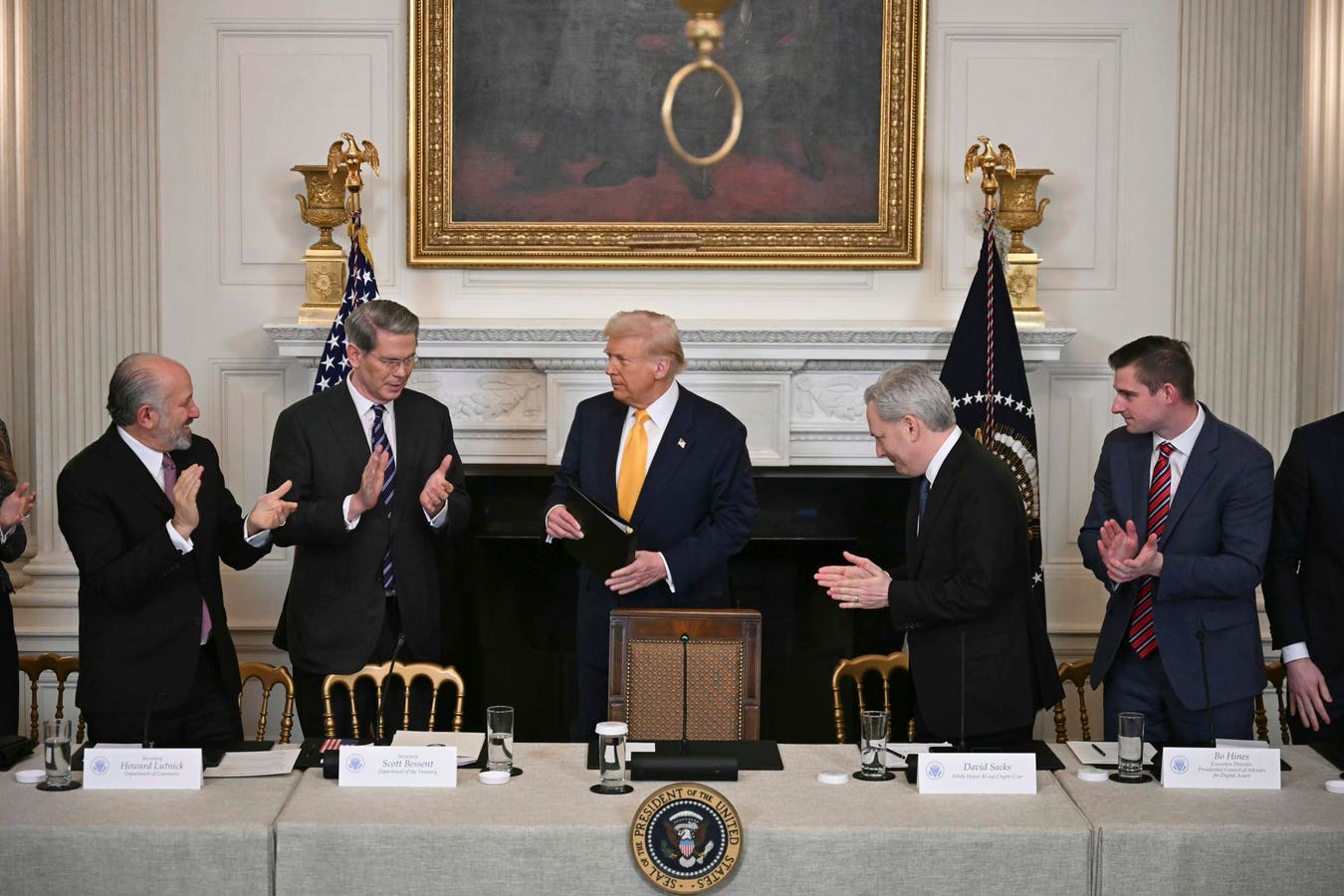Tether CEO Paolo Ardoino And Advisor Bo Hines Discuss U.S. Stablecoins
Bo Hines (far right), the former executive director of the presidential council of advisers for digital assets, pictured attending the White House Crypto Summit in Washington in his former role, next to from right to left David Sacks, White House Crypto and AI Czar, President Trump, Secretary of Treasury Scott Bessent, and Secretary of Commerce Howard Lutnick.Associated Press Tether, the first and largest stablecoin issuer of USDT, is stepping up its Washington presence after a record profit report and the signing of the first U.S. law regulating payment stablecoins. Paolo Ardoino, CEO of Tether, and Bo Hines, former White House Crypto Council Executive Director and Tether’s new Strategic Advisor for Digital Assets and U.S. Strategy, discussed the latest on their U.S. stablecoin strategy with me.
Tether, launched in 2014, has grown into one of the dominant players in the digital asset market. The company reported $4.9 billion in profit in the second quarter of 2025, underscoring its position as one of the most profitable firms in global finance. Now, as the United States implements its first federal framework for regulating payment stablecoins, Tether has turned to a former senior government official to help shape its strategy in Washington.
Last week, the firm announced it had hired Bo Hines, former executive director of the White House presidential council on digital assets, as a strategic adviser for U.S. policy. Tether CEO Paolo Ardoino and Hines discussed their views on the changing landscape in an interview on August 25, focusing on the Guiding and Establishing National Innovation for U.S. Stablecoins Act (GENIUS Act) — legislation signed by President Donald Trump on July 18 that sets new requirements for stablecoin issuers.
Bo Hines, former executive director of the Presidential Council of Advisers for Digital Assets, is pictured when in his role at the White House during the signing of the U.S. Genius Act by President Trump, is now s Strategic Advisor for Tether on U.S. strategy and digital assets.© 2025 Bloomberg Finance LP Recruiting Washington Experience Hines previously played a key role in shepherding the GENIUS Act through Congress under the direction of White House “Crypto and AI Czar” David Sacks. The law, passed on a bipartisan basis, was among the most significant policy moves of the Trump Administration aimed at providing a framework for stablecoin issuers to operate in the U.S.
MORE FOR YOU Asked why he joined Tether, Hines cited the company’s role as a major purchaser of U.S. Treasuries: “What they’re doing for the U.S. government is extremely important, just from a public‑private perspective,” Hines said. “They are one of the largest purchasers of U.S. debt, which helps ensure we retain more control over our own economy.”
Ardoino said the decision to bring Hines on board reflected respect for his ability to deliver complex legislation across party lines: “When I heard Bo decided to move on from his government job, I was impressed by his ability to drive the GENIUS Act forward and position the U.S. to seize this opportunity,” said Ardoino.
Expanding U.S. Focus Ardoino emphasized that Tether intends to deepen its engagement in the United States under the new regulatory framework. “USDT is the best ally for the United States,” Ardoino said. “We have already invested nearly $5 billion in the U.S., and our interest in strengthening our role here continues to grow,” said Ardoino.
When taking into consideration other U.S. stablecoin competitors under the GENIUS Act, Ardoino argued that competitors often focus on affluent banked customers, while Tether plans to pursue remittance use cases and underserved markets. “So there is a very huge interest in, you know, our competitors, like Circle…they’re all focused on a very thin segment. So everyone focuses on the rich people, like if the rich people had issues in making payments, they all focus on the segment of the market that is already banked, because that is the low hanging fruit.” Circle was contacted with an opportunity to respond, which was declined.
Remittances And Emerging Markets International remittances represent a key part of Tether’s strategy. Ardoino noted that U.S. migrant workers often face fees as high as 28% to send money abroad. This is where Ardoino commented that his company could help the U.S., particularly with the unbanked or underserved in the U.S. as well as those seeking to send remittances abroad.
“We see remittances as one of the biggest opportunities,” Ardoino said, pointing to strong adoption of USDT in emerging markets across Latin America, Asia and Africa. “Hundreds of millions of people are already using USDT, and remittance flows from the U.S. are the next logical step.”
Hines added that U.S. businesses could also benefit from faster, lower‑cost cross‑border payments: “Instead of waiting days for wires to clear, businesses can transact instantly with lower costs and more transparency,” he said.
Paolo Ardoino, chief executive officer of Tether Holdings Ltd., at the signing ceremony for the GENIUS Act, where President Trump acknowledged him. Ardoino hired Bo Hines, the former executive director for Trump’s council of crypto advisers in the White House, to be the advisor for Tether on U.S. strategy and digital assets.© 2025 Bloomberg Finance LP Scale, Scrutiny And Regulation Ardoino acknowledged that Tether’s rapid growth has drawn increased regulatory focus.“From 2020 to 2024, USDT supply expanded from $5 billion to more than $120 billion,” he said. “It’s no surprise regulators are paying close attention. Nearly 40% of on‑chain transaction fees are linked to USDT transfers. He also highlighted Tether’s cooperation with law enforcement, saying the company works with more than 250 agencies worldwide, including the Secret Service, FBI and the Department of Justice.
On surviving the regulatory scrutiny that the world’s leading stablecoin issuer faced, Ardoino said, “We think that we proved over and over that we were not like Terra Luna. We were not the single coin that failed into Silicon Valley Bank and those issues, we survived operation choke point 2.0…we had all the major you know, participants to the traditional financial markets calling for our debt, and we survived.”
Competition And Geopolitics Ardoino drew comparisons between Tether and competitive bank-led efforts to create stablecoins under the GENIUS Act, where he believed Tether has a strong first-mover advantage.
He also touched on geopolitical implications, arguing that some governments are seeking to reduce reliance on the U.S. dollar. “Now, wars are financial wars,” Ardoino said, suggesting that China in particular has sought influence in regions such as Africa and South America.
Outside experts have echoed concerns that stablecoins intersect with international financial competition. A June 2025 report titled The Stablecoin Race from the Atlantic Council, for example, noted that digital currencies are increasingly viewed by policymakers as tools of geopolitical leverage.
Sports Partnerships Some of the conversation touched on sports marketing, with both Hines, a former Yale football wide receiver, and Ardoino asked which athletes they would hypothetically like to see involved in promoting stablecoins.
Hines mentioned Detroit Lions quarterback Jared Goff and Cincinnati Bengals quarterback Joe Burrow, while Ardoino referenced soccer star Lionel Messi and Italian club Juventus.
For clarity, Tether has not announced any formal partnerships with athletes or teams. The discussion reflected personal preferences, not corporate agreements.












 Bitcoin
Bitcoin  Ethereum
Ethereum  Tether
Tether  XRP
XRP  USDC
USDC  Solana
Solana  TRON
TRON  Dogecoin
Dogecoin  Lido Staked Ether
Lido Staked Ether